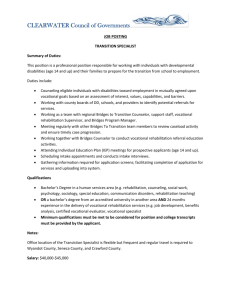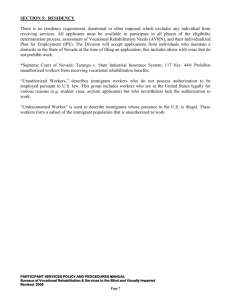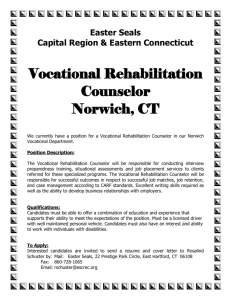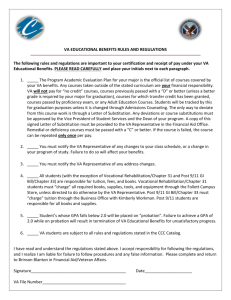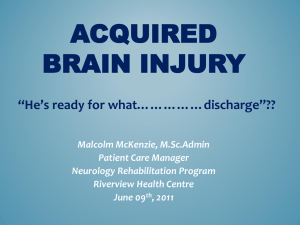Brain Injury - Powerpoint Slides
advertisement
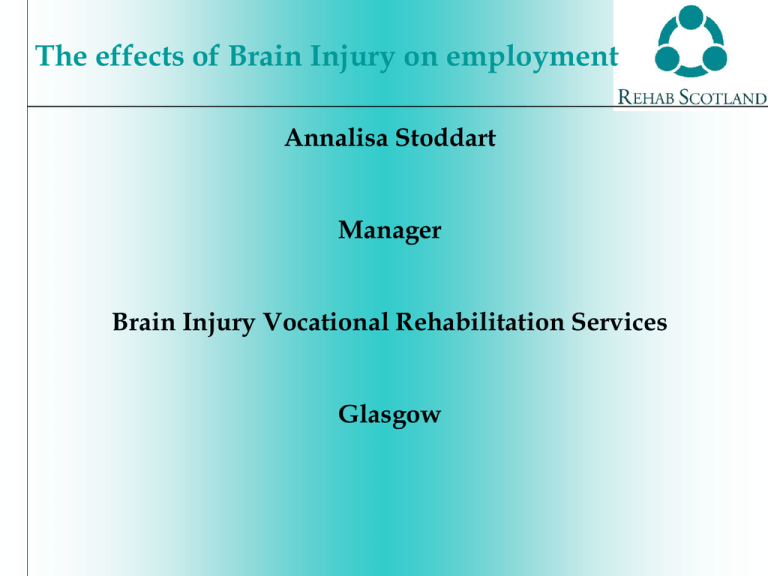
The effects of Brain Injury on employment Annalisa Stoddart Manager Brain Injury Vocational Rehabilitation Services Glasgow The effects of Brain Injury on employment Rehab Scotland – Brain Injury Vocational Rehabilitation Services Aim: To enable people with acquired brain injury to participate in further education/further training and/or employment opportunities. This is achieved by working with clients using a multidisciplinary team approach in order to enable clients to address brain injury related problems which might present barriers and to clarify and test out training/employment goals. The effects of Brain Injury on employment Introduction Brain Injury – the facts Brain Injury – the effects Case study 1 Vocational rehabilitation and supported employment Case study 2 Conclusion The effects of Brain Injury on employment Brain Injury – the facts Approximately 1 million in Britain each year Per year, per 100,000 of the population *10 – 15 severe *15 – 20 moderate *250 – 300 mild One family in every 300 will be affected by the long term effects The effects of Brain Injury on employment Brain Injury – the causes Road traffic accidents (including bicycles) Assaults Falls Sports/industrial accidents Alcohol The effects of Brain Injury on employment Brain Injury – prevalence 3:1 male/female ratio 2/3 of head injuries are aged under 30 years old Residence in urban areas where social inclusion predominates Income poverty Unemployment Lack of educational attainment High levels of crime Substance misuse The effects of Brain Injury on employment Brain Injury – types of injury Primary injury occurs at the moment of impact, being caused by the blow Secondary injury occurs as a result of systemic complications, which are potentially treatable Primary: skull fracture, cerebral contusions, diffuse axonal injury Secondary: intracranial haematoma, brain swelling, infection, raised intracranial pressure, respiratory failure, hypotension, ischaemic brain damage The effects of Brain Injury on employment Brain Injury – delayed complications Post traumatic epilepsy Hydrocephalus The effects of Brain Injury on employment Brain Injury – severity Mild head injury (75%): loss consciousness <15 minutes/no loss of consciousness Moderate head injury: loss of consciousness between 15 minutes and 6 hours/post traumatic amnesia up to 24 hours Severe head injury: loss of consciousness >48 hours/post traumatic amnesia>24 hours The effects of Brain Injury on employment Brain Injury- disability Thornhill and Teasdale – 2000 Study of 3000 people admitted to hospital with head injury Follow up of 1000 at one year post injury 78% of severe head injuries experienced disability 54% of moderate head injuries experienced disability 51% of mild head injuries experienced disability The effects of Brain Injury on employment Brain Injury – lack of follow up Most head injured receive no follow up after discharge Less than 50% were seen in hospital after discharge Only 28% received any form of rehabilitation Only 15% had contact with Social Work Most common service was physiotherapy The effects of Brain Injury on employment Brain Injury – physical effects Headaches Paralysis/mobility problems Balance problems Dizziness Epilepsy Reduced stamina Problems with co-ordination Ataxia (shakiness) Dyspraxia (message from brain to limb is blocked) Problems with continence Reduced/increased libido The effects of Brain Injury on employment Brain Injury: physical effects Visual impairment Loss of sense of smell Loss of sense of taste Impaired hearing Swallowing problems Dysarthria ( difficulties forming words ) The effects of Brain Injury on employment Brain Injury – cognitive/executive/communication effects Impaired memory Impaired concentration Increased sensitivity to noise/stimuli Reduced speed of information processing Perseveration Confusion/disorientation Lack of insight Difficulties with visual - spatial judgment The effects of Brain Injury on employment Rigidity of thought Problems with initiation/motivation Problems with planning/organising Difficulties with problem solving and decision making Word finding problems Difficulties understanding language Dyslexia and literacy problems The effects of Brain Injury on employment Brain Injury – emotional effects Agitation Anger and frustration Anxiety Depression Mood swings Reduced tolerance/increased irritability Loss of feeling/empathy Loss of confidence The effects of Brain Injury on employment Brain Injury – behavioural effects Agitation/aggression Impulsivity Disinhibition Withdrawal The effects of Brain Injury on employment Brain Injury – social effects Reduced ability to understand and cope with social interactions Interpersonal/relationship difficulties Impaired communication/social skills Family/relationship breakdown Social isolation Reduced work/educational performance Loss of role/identity Loss of employment/loss of income (less than 30%of head injured people will return to work without specialist rehabilitation and support) The effects of Brain Injury on employment Case Study 1 - Injury Details Injury sustained in 1996 Male aged 28 years Fall ( 70 Feet ) Alcohol Orthopaedic injuries/respiratory and renal complications Diffuse head injury PTA: approximately 6 weeks Length of hospitalisation: 8 weeks The effects of Brain Injury on employment CASE STUDY 1 – EFFECTS OF BRAIN INJURY Sleep disturbance and low levels of stamina Visuospatial impairment Word finding problems Disorientation Memory impairment Poor Concentration Executive Dysfunction Slowed information processing Emotional and behavioural problems The effects of Brain Injury on employment CASE STUDY 1 –REINTEGRATION Effects of trauma Effects of head injury No information or support Stress of adjustment Stress of reintegration into family,social life, education and work The effects of Brain Injury on employment CASE STUDY 1: SECONDARY PROBLEMS Reduced ability to self monitor Impaired social skills and relationship difficulties Increased stress and and loss of self confidence Difficulties balancing work and leisure Impaired work performance Reduction in earnings Housing problems Anger/frustration Loss of social/work identity/status Alcohol dependency The effects of Brain Injury on employment CASE STUDY 1: OUTCOME Exhaustion Psychiatric admission Loss of employment/income Loss of home/independence Loss of role and achievement Family and relationship breakdown Alcohol dependency Increasingly chaotic lifestyle Academic failure The effects of Brain Injury on employment CASE STUDY 1: Implications for Vocational Rehabilitation Loss of confidence in services and lack of trust Programme had to be reactive rather than proactive initially Vocational re-evaluation rather than retention Need to address secondary psycho-social problems before vocational rehabilitation was possible Lack of insight Family denial The effects of Brain Injury on employment Case Study 1 – vocational rehabilitation: a multi disciplinary team approach Manager Clinical Neuropsychologist Assistant Psychologist Work Related Social Skills Tutor Employment Liaison Officer Job Coach Occupational Therapist/Job Coach The effects of Brain Injury on employment CASE STUDY 1: INDIVIDUAL PROGRAMME PLANNING Assessment Induction Introduction to structured environment and activity Brain Injury Awareness Training Training cognitive and executive skills Stress, anxiety and relaxation training Social reintegration and leisure activities Work Related Social Skills Training Individual psychological support and Liaison with Community Psychologist Family information and support Referral to Housing Department Welfare rights advice The effects of Brain Injury on employment CASE STUDY 1: INDIVIDUAL PROGRAMME PLANNING Vocational profiling Vocational exploration Job Seeking Skills Training Liaison with university Liaison with an architects’ business Setting educational/vocational goals Supported study for diploma thesis in Architecture Study Skills Training Work Placement in an architects’ office, supported by a specialist job coach The effects of Brain Injury on employment CASE STUDY 1: OUTCOME Passed Diploma Thesis in Architecture: June 2001 Employed by Architects Office: September 2001 The effects of Brain Injury on employment Vocational rehabilitation and supported employment – ideal model Information, advice and support to client and family Early intervention Employer liaison Community integration Holistic assessment with other agencies, family and client input Neuropsychological/occupational therapy assessment as required Individual programme planning (multi disciplinary approach) The effects of Brain Injury on employment Vocational rehabilitation and supported employment – ideal model Psychosocial rehabilitation Training in compensatory strategies for physical problems/ stamina building Flexible and realistic vocational profiling and exploration Information technology training Graded work experience placements with job coaches as transitional specialists (place and train model) The effects of Brain Injury on employment Vocational rehabilitation and supported employment Regular review of work goals Specific vocational training as required/study skills training Job seeking skills training and intensive job search Marketing to employers Ideal job match Back to work benefits advice Transitional/through care support in employment Optimal use of natural supports in the workplace Independence in the workplace/supported employment The effects of Brain Injury on employment CASE STUDY 2 - INJURY DETAILS Injury sustained in May 1998 Male aged 34 years old Fall down stairs, circumstances unclear Admitted to Glasgow Royal Infirmary. CT brain scan: left subdural haemorrhage with significant mass effect and oedema 2 small intracerebral haematomas in the right and left frontal lobes Transferred to The Southern General Hospital( no surgery – conservative treatment Returned to GRI PTA 2-3 days. Length of hospitalisation, 2 weeks The effects of Brain Injury on employment CASE STUDY 2: EFFECTS OF HEAD INJURY Headaches Sleep disturbance and low levels of stamina Dizziness and positional vertigo Impaired memory and poor concentration Slowed information processing Difficulties in initiating, planning and organising tasks Word finding problems Low mood and irritability Increased sensitivity to noise Low levels of motivation High levels of anxiety/panic attacks Low confidence and social isolation The effects of Brain Injury on employment CASE STUDY 2: SUPPORT PROVIDED PRIOR TO REFERRAL TO VRP Information regarding head injury and its effects Regular home support visits Allocation of a support worker to assist community integration activities, including travel management Liaison with employer/negotiation of medical retirement Benefits advice and assistance Anxiety management Information about/support to implement compensatory strategies for memory impairment Carer support/information Referral to and assistance to attend The Head Injuries Trust for Scotland Referral to Rehab Scotland, Brain Injury Vocational Rehabilitation Programme The effects of Brain Injury on employment CASE STUDY 2: Assessment of needs at referral Dizziness/balance problems Headaches Poor stamina Memory impairment Difficulties with concentration( especially divided attention) Difficulties initiating, planning and organising tasks Anxiety Low mood Low levels of motivation Lack of hope/goals in relation to returning to work The effects of Brain Injury on employment CASE STUDY 2: INDIVIDUAL PROGRAMME PLANNING Induction Gradual introduction to a structured, simulated work routine/environment Neuropsychological assessment Brain Injury Awareness Training Cognitive training for memory/concentration problems Rehabilitation strategies for executive problems Stress,anxiety and relaxation training Individual psychology support re anxiety and low mood Work Related Social Skills Training The effects of Brain Injury on employment CASE STUDY 2: INDIVIDUAL PROGRAMME PLANNING Social Re-integration and leisure activities Individual Resource Project: Teaching others to play guitar Family information and support (e.g childcare) Client representative training Information Technology Training ( Certificate) Vocational profiling and exploration Specific vocational training in Lifting and Handling 2 Work Experience Placements ( Support Worker) Review of work goal and Job Seeking Skills Training. (Cert) Intensive Job search Outcome: Employment, August 2000 as a concierge with Glasgow City Council, Housing Department The effects of Brain Injury on employment The benefits of early intervention, facilitated by an integrated pathway approach which promotes joint working: Case Study 1: Significant gap between brain injury and return to employment (5 years) Case Study 2: Reduced gap between brain injury and employment (2 years) Case Study 1: Significant secondary problems affecting mental health, family relationships and readiness/willingness of client/family for specialist intervention Case Study 2 : Information and support at an early stage facilitated effective intervention, trust in service providers and family involvement/commitment The effects of Brain Injury on employment Range of employment outcomes Architect – City centre practice Concierge – Glasgow City Council Support worker – Turning Point Support worker – Care Line Warehouse assistant – Index Project Co-ordinator – Glasgow Play Scheme Association Support worker – Key Housing Warehouse assistant – Clothing factory Sports centre assistant – National Sports Centre - Largs The effects of Brain Injury on employment Vocational rehabilitation – benefits Cost effective (80% employment/15% further education/training) Addresses specialist problems Empowers Feedback mechanism which captures performance targets Promotes personal/professional development Reduces psychosocial problems Promotes social and economic inclusion
